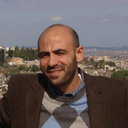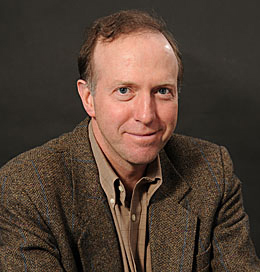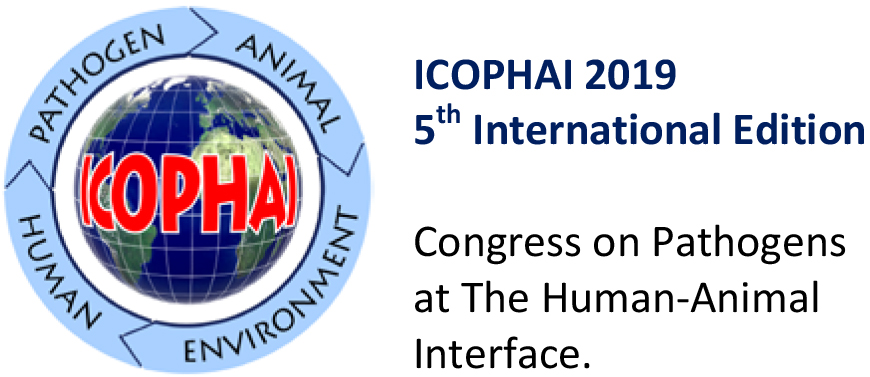ICOPHAI 2017 program includes a keynote speaker presenting Global “One Health” with a focus on defined thematic area to be finalized by the Executive body and Advisory board. The current proposed theme for 2017 is: “ Environmental changes and Impact on global health priorities”
The thematic areas addressed on this congress include:
- KEYNOTE ADDRESS- "Environmental challenges and impact on global health."
- Special Session: Zika virus, Emerging and re-emerging Infectious Diseases
- Panel Discussion: One Health and impact of climate change;
PLENARY SESSIONS
- Antimicrobial Resistance and drug related issues;
- Biosecurity, Biodefense and Disaster Response;
- Pathogenesis, vaccine development and new Meta-Genomic Technologies;
- Food-borne and Water-borne Diseases;
- Parasitic and environmental Zoonoses;
- Innovative Capacity Building, e-Learning and Outreach approaches
Additional presentations at evening receptions and dinner will also be made by renowned international experts on relevant issues such as climate change, globalization, interaction with chronic diseases etc.
The ICOPHAI 2017 will include pre-congress workshops and courses on November 5-6. The specific areas will be based on requests initiated form local, regional and global partners. Areas may include topics such as Molecular epidemiology of zoonotic diseases (as done in 2013 and 2015)
Based on the three previous ICOPHAI versions, we expect upto 500 participants with more than 250 submissions for oral and poster presentations for ICOPHAI Qatar 2017.
The ICOPHAI 2017 Scientific Program and Schedule of Events can be found here.
For the Pre- Congress Workshop Agendas please click on the following links:
Exposure and Toxicological Characteristics of Chemical Agents in the Environment
One Health Approach to Combat AMR
PRE-CONGRESS WORKSHOPS
The Qatar University Biomedical Research Center will host a pre-congress workshop entitled "Exposure and Toxicological Characteristics of Chemical Agents in the Environment" on Sunday, 05 November 2017 at the Ritz Carlton. Dr. Michael Bisesi, the Sr. Associate Dean of Academic Affairs, Professor and Chair of the Department of Environmental Health Sciences within OSU's College of Public Health will be the lead speaker.
The Qatar Ministry of Public Health (MOPH) and the Hamad Medical Corporation will host a pre-congress workshop entitled “One health approach to combat AMR" on Monday, 06 November 2017 at the MOPH building. The lead speaker is Dr. Nahla Hassan Sharaf, an Infection Control Observer within the MOPH’s Health Care Quality Management and Patient Safety Department.
OPENING SESSION SPEAKERS:
 |
Roberto Bertollini, MD, MPH Dr. Bertollini is currently the advisor for the Minister of Public Health, Government of Qatar. Previously, he served as the WHO Representative to the EU in Brussels and Chief Scientist of the WHO Regional Office for Europe, coordinator of the Evidence and Policy for Environment and Health unit of the WHO Department of Public Health and Environment in Geneva with the special task to develop the WHO global policy and response to the health impacts of global climate change. Dr Bertollini also served as the Director of the Division for Technical Support “Health Determinants” at the WHO Regional Office for Europe based in Copenhagen, DEN, Director of the WHO EURO Special Programme on Health and Environment, with offices in Copenhagen (DEN), Rome (ITA) and Bonn (GER). Earlier in his career, he was Director of the Rome Division of the WHO European Centre for Environment and Health. Dr Bertollini holds a degree in medicine and a postgraduate degree in pediatrics and holds a Master in Public Health (MPH) that he earned from the Johns Hopkins University in 1983. His main professional interests are the environmental influences on health, with special reference to the effects of emerging threats such as climate change, health effects of lifestyle and socioeconomic determinants including tobacco, alcohol and nutrition, the use of epidemiology for public health policy development and evaluation of public health programmes and practices. ICOPHAI Executive Body welcomes Dr Bertollini to its global community and thanks him for his agreement to serve as the ICOPHAI 2017 Keynote Speaker. Website: www.moph.gov.qa / www.nhsq.info |
SPECIAL SESSION
 |
TOPIC: Zika virus, Emerging and re-emerging Infectious Diseases This plenary session will focus on emerging infectious zoonotic, vector-borne, diseases at the human, animal (domestic and wild) and environment interface. The major emphasis will be Ond recent epidemics and pandemics concern with very high significance currently. Some examples of what will be covered include Zika virus, Middle-eastern Respiratory Syndrome (MERS); endemic hemorrhagic fever episodes (such as Crimean Congo) and others. This session will be led by a world-renowned plenary lead speaker followed by short slide presentations competitively selected from submitted abstracts Speaker: Larry Schlesinger, MD President and CEO Texas Biomedical Institute, formerly Samuel Saslaw Professor of Medicine; Chair, Department of Microbial Infection, and Immunity; Founding Director, Center for Microbial Interface Biology. Website: https://www.txbiomed.org/ Dr. Schlesinger who is currently transitioning into the private sector where he will begin his tenure as President/CEO of Texas Biomed on May 31, 2017 is one of the preeminent authorities in the field of infectious diseases. His main interests lie with tuberculosis and lung biology, more specifically the pathogenesis of tuberculosis and other airborne infectious agents that subvert lung immune mechanisms. His discoveries have led to greater insight into the mechanisms and components underpinning the interactions at the host-pathogen interface translating them into drug discovery platforms. He holds a BA in Biology from Cornell University, an MD from Rutgers Medical School, and fulfilled his residency requirements in Internal Medicine at the University of Michigan and clinical and research fellowships in Infectious Diseases at UCLA. His career highlights include stints as Fellowship Director for the Division of Infectious Diseases and Associate Chair of the Department of Medicine at the University of Iowa (1991), Director of the Division of Infectious Diseases, Department of Internal Medicine at The Ohio State University, and is the current chair of the department Microbial Infection and Immunity. Leveraging his expertise in clinical and translational research he has mentored the next generation of scientists (he has been/is a faculty member of 10 pre- and post-doctoral training programs), and has been committed to building strong interdisciplinary academic programs throughout his career.
|
|
Moderator Wondwossen A. Gebreyes, DVM, PhD Diplomate ACVPM |
Discussant Hadi Mohamad Yassine |
Discussant Walid Alali, PhD |
Discussant Celso José Bruno de Oliveira, DVM, PhD |
Discussant Sylvain Quessy, DVM, PhD |
 |
 |
 |
 |
 |
PLENARY SESSIONS
 |
SESSION 1: Parasitic and environmental Zoonoses This plenary session will focus on one the leading global public health issues, antimicrobial resistance and antimicrobial use in humans, animals and the environment. associated co-selective agents in the environment such as biocides, heavy metal micronutrients and other agents will also be discussed. Considering the theme of the 4th ICOPHAI is on environment, Foucault on antimicrobial issues associated with water, air and also solid matrices will receive special emphasis. The plenary session will include one lead invited speaker and several short slide presentations selected competitively based on abstract submissions. Lead Plenary Speaker: Dr. Filipe Dantas-Torres, MV, MSc, DSc, PhD, FRES, Dipl. EVPC, Email: fdtvet@gmail.com Dr. Dantas-Torres is a Researcher at the Aggeu Magalhães Research Institute (Fiocruz, Brazil). He is a veterinarian (MV) with a Master of Sciences (MSc) and a Doctor of Sciences (DSc) from the Aggeu Magalhães Research Institute. He also holds a Dottorato di Ricerca (PhD) from University of Bari, Italy. In 2010, he was elected Fellow of the Royal Entomological Society (FRES) and the collegiate body of the Faculty of Veterinary Medicine of the University of Bari nominated him as Cultore della Materia in Parassitologia e Malattie Parassitarie (Expert in Parasitology and Parasitic Diseases). In 2013, he became the first Brazilian to receive the tittle of Diplomate of the European College of Veterinary Parasitology (Dip EVPC) and received the Peter Nansen Young Scientist Award from the World Association for the Advancement of Veterinary Parasitology (WAAVP). Dr. Dantas-Torres is the author or co-author of ~300 publications, including ~180 papers in refereed journals and 8 book chapters. He is on the editorial board of two leading international journals (Medical and Veterinary Entomology and Parasites & Vectors) and reviews for over 40 journals. His research interests include parasitology and parasitic diseases. In particular, he has been involved in research projects on diagnosis, epidemiology and control of vectorborne parasitic diseases, including leishmaniasis, dirofilariosis, and babesiosis. He has extensively studied many aspects (from taxonomy to control) related to the brown dog ticks (Rhipicephalus sanguineus sensu lato).
|
 |
SESSION 2: Innovative Capacity Building, e-Learning and Outreach approaches This plenary session will focus on advanced information and communication technology approaches that are used for the scientific advancement in global health mainly focusing on One Health issues at the interface of animal, human and the environment. Approaches that are used for capacity building in research data collection, online and distance education training and targeted outreach areas will be discussed. The plenary session will include one lead invited speaker and several short slide presentations selected competitively based on abstract submissions. Lead Speaker- Nicole Kraft, Clinical Assistant Professor, School of Communication, The Ohio State University Email: kraft.42@osu.edu Nicole Kraft spent 25 years as an award-winning reporter, editor and magazine journalist, while working also in public relations for professional athletic and government communications. She joined the Ohio State School of Communication in 2010 as an assistant professor of journalism, and her classes include Media Writing and Editing, Sports Media, Magazine Writing, and Media Law and Ethics. Her focus in teaching and research has been in utilizing technology in journalism and global education, as well as the intersection of sports and society and the myth of the digital native. She is co-director of Ohio State’s Sports & Society Initiative, and as part of the Global One Health Initiative she teaches annually in Ethiopia. Nicole has published the interactive books “Always Get the Name of the Dog: A guide to media interviewing” and “Writing Like Rabbits: A guide to becoming a magazine writer.” In 2015 Nicole was named an Apple Distinguished Educator. She is also an active journalist, writing numerous magazine features and covering sports for the Associated Press and Columbus Dispatch.
|
 .. .. |
SESSION 3: Antimicrobial Resistance and drug related issues This plenary session will focus on one the leading global public health issues, antimicrobial resistance and antimicrobial use in humans, animals and the environment. associated co-selective agents in the environment such as biocides, heavy metal micronutrients and other agents will also be discussed. Considering the theme of the 4th ICOPHAI is on environment, Foucault on antimicrobial issues associated with water, air and also solid matrices will receive special emphasis. The plenary session will include one lead invited speaker and several short slide presentations selected competitively based on abstract submissions. Lead Plenary Speaker: Satoru Suzuki, PhD Ehime University, Matsuyama, Japan Professor of MicrobiologyDivision of Aquatic Biosciences Center for Marine Environmental Studies (CMES)Laboratory of Marine Molecular Ecology (MME) E-mail: ssuzuki@ehime-u.ac.jp Dr. Satoro Suzuki is a professor microbiology Ehime University, Matsuyama Japan. His main focus is on Biochemical and molecular biological approaches to microbial ecology in marine environment. He obtained a Bachelor of Science from Hokkaido University, Hakodate, Japan, and Doctor of Philosophy degree from, Hokkaido University, Sapporo Japan. His current interests include 1) Occurrence, latency and transfer of antibiotic resistance genes in marine and human-related aquatic environments. Resistances to tetracycline, sulfonamide and quinolones 2) Role of microbes for formation and decomposition of protein in seawater. Proteases and refractory proteins are focused. 3) Ecology of birnavirus in aquatic environment.
|
 |
SESSION 4: Biosecurity, Biodefense and Disaster Response This plenary session will focus on major issues of preventing spread of highly infectious agents that may be used as bio weapons across borders. The presentations would focus on agents of significance, way and means including various biosecurity measures to minimize and prevent such risks; and also how to effectively respond when and if such scenarios occur. The plenary session will include one lead invited speaker and several short slide presentations selected competitively based on abstract submissions. Lead Plenary Speaker: Douglas T. Shinsato, JD, MBA. Dr. Shinsanto has had a long and successful career in consulting and sales-driven corporate management. He is active on cross-border innovative digital payments platforms. He also works with his global team members. Mr. Shinsato holds an M.B.A. degree from the University of Southern California, a J.D. degree from the Stanford Law School; and a B.A. from the University of Southern California.
|
 |
SESSION 5: Pathogenesis, vaccine development and new Meta-Genomic Technologies This plenary session will focus on broad topics including the host-pathogen and ecosystem interaction; targeted areas of prevention particularly new vaccine development against pathogens of interest and also advanced technologies that are used to prevent, control as well as regulate such agents such as Whole Genome Sequencing, Microbiome and other technologies. The plenary session will include one lead invited speaker and several short slide presentations selected competitively based on abstract submissions. Lead Plenary Speaker: Barney S. Graham, M.D., Ph.D. The National Institutes of Health, Bethesda MD Deputy Director, Vaccine Research Center Chief, Viral Pathogenesis Laboratory and Translational Science Core I am committed to the goal of advancing candidate vaccines for coronaviruses, paramyxoviruses, and other viruses of clinical importance into clinical evaluation. The primary approach is based on our success with respiratory syncytial virus antigen design and based on atomic-level antigen design and a fundamental understanding of virus neutralization. I have extensive experience in animal models for respiratory virus diseases and have investigated pathogenesis, T cell epitope identification and characterization, function of regulatory T cells, epitope structure, mechanisms of neutralization, and vaccine development. Recently work on beta-coronaviruses to define the structure of the prefusion Spike, isolate monoclonal antibodies from mice, NHP, and humans for MERS and HKU1 CoV, and establish multiple serological assays has provided reagents and analytical tools that allow us to characterize the antigenicity and immunogenicity of CoV Spike vaccine antigens. It has also supported the concepts established in the RSV work that are now being applied to other paramyxoviruses including Nipah. These resources and reagents will be available to facilitate the work in the proposal. This work supports the mission of the NIAID Vaccine Research Center to facilitate the development of vaccines for HIV and other viral diseases of medical importance such as MERS CoV and Nipah. Email: bgraham@mail.nih.gov |
 |
SESSION 6: This plenary session will focus on the epidemiology and ecology of major food and water-borne diseases. Special focus will be given to major viral and bacterial pathogens mainly common in plants and animals that cause major disease burden in humans and are known as leading public health issues. The plenary session will include one lead invited speaker and several short slide presentations selected competitively based on abstract submissions. Lead Plenary Speaker: Dr. Manon Racicot, PhD Email: Dr. Manon Racicot is a veterinary epidemiologist and she works for the Canadian Food Inspection Agency (CFIA) since 10 years. She completed a PhD in 2011 at the Faculté de médecine vétérinaire de l'Université de Montréal on the biosecurity compliance of poultry farms. Afterwards, she worked for the CFIA Animal Biosecurity Office from 2011 to 2013, and now she is a food risk analyst. She manages the development of the risk assessment model based on food manufactures and the risk assessment model for hatcheries. She is also adjunct professor at the Université de Montréal and her research interests are biosecurity, compliance, food safety and risk assessment.
|
EVENING DINNER SPEAKER
  |
This special presentation will highlight global capacity building and the role of academia and in general the cross partnership among disciplines and geographic regions. The 4th ICOPHAI Dinner speaker will focus on "Current U.S. Political Environment and Impact on Global Capacity Building Partnerships. Lead Speaker- Prof. William Brustein, Vice President for Global Strategies and International Affairs Eberly Family Distinguished Professor of History Email: globalaffairs@mail.wvu.edu Dr. William Brustein who is a renowned scholar in the field of international studies is the Vice President for Global Strategies and International Affairs, as well as Professor History, Political Science, and Sociology at West Virginia University in Morgantown, West Virginia. He previously served as The Ohio State University’s Vice Provost for Global Strategies and International Affairs (as the Senior International Officer and Chief Strategist for the university’s international engagement and comprehensive internationalization); Professor of Sociology, Political Science and History; and President, OSU Global Gateways LLC where he oversaw multi-functional offices representing The Ohio State University in China, India, and Brazil. In addition, he has held several prestigious posts throughout his distinguished career, most recently serving as the Associate Provost for International Affairs and Director of International Programs and Studies at the University of Illinois at Urbana-Champaign. Dr. Brustein holds a Ph.D. and an M.A in sociology from the University of Washington, Seattle Washington; an M.A. in International Studies from John Hopkins School of Advanced International Studies, Washington DC; and a B.A in Political Science from the University of Connecticut, Storrs, CT. |
CLOSING SESSION SPEAKERS
Leaders from Hamad Medical Corporation (HBC), Hamad Bin Khalifa University (HBKU), Qatar University (QU), and The Ohio State University (OSU)

